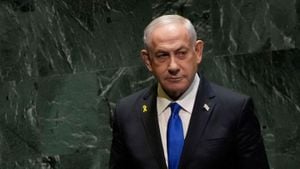Donald Trump’s anticipated return to the White House has spurred predictions of dramatic shifts, particularly concerning U.S. foreign policy and its entrenched alliances. With increasing international tensions and the continual evolution of global geopolitics, many observers wonder: how will Trump's second term redefine America's role on the world stage?
One of the first areas likely to be affected is relations with Israel, which have been fervently supportive under previous administrations but could take on new dynamics under Trump. Unlike Joe Biden, whose administration maintained diplomatic efforts with both Israel and Palestine, Trump appears to be embracing a more unequivocally pro-Israel stance. Historian and political analyst, Aaron David Miller, noted, "Trump’s foreign policy during his first term was characterized as opportunistic, transactional, and ad hoc." This raises questions about whether he intends to adopt similar tactics or seek greater stability and predictability.
Since leaving office, Trump has made clear his lack of commitment to the establishment of a Palestinian state, which diverges significantly from the diplomatic strategies of his predecessors. This perspective resonates strongly within the Republican Party, whose base has increasingly adopted pro-Israel sentiments. While Biden’s approach often involved critique and pressure over civilian casualties arising from military actions, Trump’s administration is expected to be assertively supportive of Israel's military strategies, reinforcing the notion of unconditional support.
But what of the Palestinians? Trump and his allies, such as his potential cabinet nominees, including Senator Marco Rubio and former Arkansas Governor Mike Huckabee, appear unlikely to pursue initiatives aimed at addressing Palestinian statehood. This pivot could exacerbate tensions, especially as Gaza finds itself at the center of new military engagements. Notably, Huckabee has voiced his firm support for Israel's right to defend itself with minimal restrictions.
Shifts may also occur beyond American-Israeli relations. Regional geopolitics may evolve, especially concerning neighboring Arab nations. According to Israeli think-tank director, Elie Pieprz, Trump’s return could signal positive developments for Israel, such as improved relations with Saudi Arabia, potentially easing diplomatic frictions encountered during Biden’s administration. This could allow Trump to tap on historical partnerships and favor policies underpinned by mutual defense accords.
While the weight of international relations remains heavy, Trump's focus on domestic issues such as the economy and immigration could also influence his foreign policy. With the slogan 'America First' echoing from his first term, Trump may advocate for strategies focusing on boosting American interests, economic diplomacy, and security over long-term military commitments overseas. This potential pivot aims not only to create economic resilience at home but also to encourage allies, especially Israel, to take more responsibility for their security.
Analysts speculate this could lead to increased military and economic empowerment for Israel, pushing them toward more aggressive posturing against perceived threats from Iran and terror groups like Hamas. The emphasis on Israel’s self-reliance could halt prior American engagements of balancing power among Middle Eastern nations.
There’s also the question of how Trump's policies will affect U.S. relationships with countries reflective of anti-Israel sentiments, such as those within the Middle East. Following recent moves made during Biden's tenure—complicated by pressures from progressive factions within the Democratic Party—ambassadors and advisors aligned with differently paced diplomatic agendas could find their efforts thwarted under Trump.
Intense debate surrounding Biden's methods toward Israel could signal changes akin to Trump’s less conventional style. Miller suggests Trump’s diplomatic engagements may reframe traditional negotiations, bringing with it both possibility and peril. If Trump exerts pressure on Netanyahu during crises, it might lead to unprecedented negotiations—but if his strategies, focused largely on American interests and maintaining sales of arms, miss the nuances of complex regional dynamics, consequences could spiral.
Adding to this commercial perspective, Trump’s second term could establish new pathways for arms agreements, influencing how regional conflicts, especially those involving Israel, are engaged and resolved. The focus could shift to countering global competitors like China rather than maintaining extensive military commitments abroad, reshaping existing alliances.
The broader impacts of Trump’s policies may not be isolated to the Middle East. Given the fractures seeping through U.S.-China relations, his administration's focus might also include recalibrated diplomatic tactics toward Asia, particularly as tensions boiling over issues like Taiwan rise to global prominence.
Yet as Trump re-emerges politically—this time potentially capitalizing on critics of recent foreign policies—it remains subject to the challenges of his previous term. While he may aim for more aggressive dealings, unpredictable situations like the Gaza crisis could provoke swift developments, necessitating responsive rather than reactive strategies from the White House. For many, it's uncertain how decisive Trump’s maneuvers may be or whether they will stabilize tensions or ignite new conflicts.
All these conjectures lead to one pivotal question: What will Trump's second term look like, and how will it impact relationships with key allies and adversaries? The globally influential nature of his decisions resonates from the halls of the White House to the streets of Jerusalem, creating ripples across continents. The future of U.S. foreign policy seems ready to pivot, with international leaders and citizens alike awaiting the outcomes of impending decisions.



